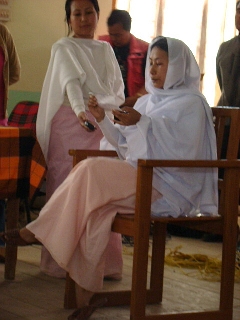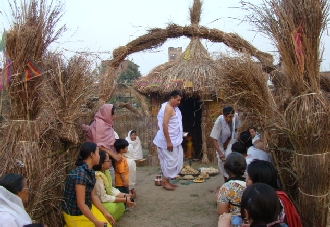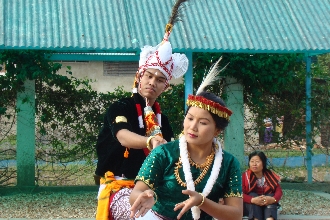As we are driven out of Imphal for sight-seeing to Loktak Lake (one of the largest fresh water lakes in northeast India) or to Moreh (a town at Manipurs border with Burma), we are stopped a couple of times by the security forces to check us up. The vehicle stops almost equal number of times and the driver goes down to a shop or in some alley, comes back and we drive on. Later we learn that driver has to go to pay the tax!
In Manipur, a ten-sitter vehicle pays Rs.100 and a truck pays Rs.500-1000 as tax to the local underground groups. And there are many along the route! Drivers quietly pay up as they factor it in as cost which is charged to us clients. No wonder then, vehicle-hire in Manipur is an expensive part of the tour! A three hour drive from Imphal to Kohima (147 kms) costs Rs.6000-8000 for a non-AC ten-sitter. The same would cost at the most Rs.1500 for a ride along the Mumbai-Pune super express highway.
Sons of soil turning extortionists
This is just a miniscule glimpse into the extortions by underground groups UG as they are labeled even in Manipurs print media. And counting the number of insurgents is like counting stars, says Babloo Loitongbam of Human Rights Alert in Imphal. According to the reply to a recent Legislative Assembly question, the number of armed insurgents is 12000. The highest insurgent to civilian ratio is in Manipur, not Afghanistan or Iraq, says Babloo. The armed forces personnel strength in the state is 55000, which translates to 4-5 armed security personnel for every armed rebel.

![]() Dr Kishen Singh Thingam's widow. Resistance to extortions is met with the grave consequences. Dr Thingam was an upright civil servant who refused to the demands of an underground group, and was brutally killed in February this year in Ukhrul district. Pic: Surekha Sule.
Dr Kishen Singh Thingam's widow. Resistance to extortions is met with the grave consequences. Dr Thingam was an upright civil servant who refused to the demands of an underground group, and was brutally killed in February this year in Ukhrul district. Pic: Surekha Sule.
And yet, these insurgents are literally holding entire state to ransom demanding tax at every walk of life and resorting to violence. There is an organised racket of taking a share from government spending under every head be it for road construction or water scheme or even salaries of government employees. Some people reckon, as high as 70 per cent of funds allocated for any development project go in distributing cuts to underground groups. What work can be done in the balance 30 per cent is anybodys guess!
It is not surprising then that the infrastructural set up in Manipur is in dire state with just four hours of power every day and roads are in broken condition soon after laying. Any resistance to extortions is met with the grave consequences as in case of Dr Kishen Singh Thingam. He was an upright civil servant who refused to the demands of an underground group, and was brutally killed in February this year in Ukhrul district.
Media in the line of fire
Even media in Manipur is not spared with UGs dictating their terms. A senior media person from a leading daily from Imphal who survived insurgents bullet injuries, says if we print something criticizing a particular UG, they force us to retract the statement and threaten with dire consequences. They dictate what we write and what we dont. Another media person narrated how his newspaper was caught in the conflict between two warring UGs. One group ordered writing against the other and the other ordered an apology for doing that, he says.
These terrorists think they are the sons of soil, then why they make their mothers and sisters suffer in their business of extortions, says a wellknown member of the local elite in Imphal, requesting anonymity.
The first step in the kind of situation we are faced with in Manipur, where there is an undercurrent of secession, rampant corruption led by the politicians and tamely abetted by the bureaucrats, and a complete failure by the state to protect the few upright government servants, is to list out the local civil, judicial and police officers and identify the few who have not been tainted by corruption and who, if protected, are likely to stand up against intimidation.
"The second step is to post these officials in all crucial posts .The third step is to ensure that reliable judicial officers are posted .
Civil society groups do protest. The protests that are loud and clear are against the establishment the security forces -- and not so loud against the umpteen insurgent groups. It is easy to identify the state repressors the security forces who have unlimited power under the draconian Armed Forces Special Power Act (AFSPA). But excesses have been committed not only by the armed forces but so also by the countless insurgent groups who are fighting each other.
Distrust, apprehension about outsiders
The situation is so complex and appears hopeless to the outsiders. There is a general atmosphere of distrust and everyone is eyed with suspicion. Given this state of affairs in Manipur, there is no tourism worth the name.
All the same time, the people of Manipur look up to the people from mainland, especially media to carry home the message from them about the grim situation and to understand their predicament. The 7th annual meet of Network of Women in Media, India (NWMI) during March 5-7, 09 was an opportunity for both media from the mainland India and people of Manipur to establish channels of communication. The meet was organised by Manipur chapter of NWMI led by Anjulika Thingam in the face of personal tragedy of loss of her brother Dr Kishen Singh Thingam. About 60 women journalists from all over India got first hand exposure to the grueling issues of the state and also witnessed on March 7th, the release and re-arrest of Sharmila the iron lady on the fast unto death for last eight years demanding end of AFSPA.
Armed Forced Special Powers Act: condemned by many
The Armed Forces Special Power Act (AFSPA) has been in force in many parts of the Northeast and J&K for decades. But nowhere is it protested like in Manipur. Using the provisions in this Act, some security personnel misuse the power to search, destroy any structure and arrest, shoot, kill any suspect without the fear of any prosecution for gross violation of human rights. In 2000, Irom Sharmila witnessed Assam Rifle men shooting down 10 civilians at a bus stand in a town near Imphal in retaliation to insurgents attacking their convoy. Already she had witnessed Manipuri women raped and killed by the armed forces and she decided to go on fast unto death since then demanding repealing of AFSPA. She is arrested and is being force fed through nasal tubes in the custody. But one cannot be detained for more than a year for this crime, so she is released every year. Since she does not touch water or food, she is rearrested next day.

![]() Holi celebration in Imphal this year. Pic: Surekha Sule.
Holi celebration in Imphal this year. Pic: Surekha Sule.
Sharmila has become an icon of Manipur womens protest against armed forces with Meira Paibi (meaning Women Torch Bearers) rallying behind her. In 2004, Manorama was killed by Assam Rifles which led to histrionic stripping down by 12 Imas (mothers) from Meira Paibi in front of Kangla then the head quarters of Assam Rifles in the sprawling erstwhile royal fort. This sent shock waves across the region and the demand for AFSPA repeal was intensified with civil society groups and human rights activists joining the protest. *(Manorama was originally alleged to have been raped.)
This moved the Centre too and the Assam Rifles was shifted out of the fort. A committee headed by Justice Jeevan Reddy was appointed to examine the demand for AFSPA repeal. However, while recommending AFSPA repeal, the Jeevan Reddy committee has not looked into the alternative solution to the states insurgency.
I spoke to a cross section of Manipuri society and experts and got a mixed response to the issue of AFSPA and insurgency. True, despite AFSPA and 4-5 security persons for each insurgent (going by available data), the insurgency still goes unabated. What will happen if armed forces are withdrawn? Will it not give insurgents a free playing field?
Says Babloo Loitongbam, The armed forces should be above the law and not under the law, they have to be answerable to the system. This argument is supported by a woman journalist narrating her experience of high-handedness by the security forces. Traveling in the northeast for a photo feature assignment, she reached a town in Assam late in the evening and had her camera around her neck. Just then, an armed police was beating up a person pulling down the shop shutter. This policeman pulls off the camera from her neck though she had not taken any photos and takes her to the police station where they exposed her film destroying all her painstakingly done work. All they could have done is to develop the film and remove only those they suspected. And there is no recourse for such acts of the security forces under AFSPA as it allows them to destroy anything on suspicion.
As Babloo suggests, if the armed forces were above law then this journalist at least could have sought justice. Yes, police can interrogate her on suspicion but cannot destroy her work! They cannot take law into their own hands, torture, rape and kill civilians.
In response, an army officer on condition of anonymity, says, During a riot like situation is there time to attest a suspects bona fide? Again, is there enough time to get official order to take action against the suspects, if we are not armed with AFSPA? Insurgents are hiding in a structure but we await orders and fall prey to their bullets? Civilians have little knowledge about armed forces operations. On one hand they call for tying our hands and then also have unrealistic expectations from us to finish insurgency. Just for few cases of rape and violence, entire armed force is branded as villain, which irks and demoralizes our men. You must have seen soldiers with rifles keeping a roving eye on the streets of Imphal but have you noticed anyone looking straight at you or any other indication of misbehaviour?
Most of the elite in Imphal tow the popular line of criticising AFSPA, but in private say that end of Army rule means uncontrolled extortions and a new rein of terror in the state.
But Padmashri A M Gokhale, former chief secretary of Nagaland vehemently opposes AFSPA saying There is absolutely no need for such a law. You win people through friendship and not through confrontation. Gokhale made his mark in Nagaland during equally bad situation winning over peoples confidence through his projects Village Development Board VDB and Nagaland Empowerment of People through Economic Development NEPED.
Experts, observers and also civil servants accept that a lot of wrong was done in the Northeast states especially because of AFSPA, which gave rise to the current strife.
Genesis of the insurgency
Manipur is like a bowl - valley surrounded by hills. While valley of Imphal was ruled by Vaishnavite Meitei, the surrounding hills were ancestral domain of Nagas and Kukis. Manipur kingdom came under British Rule in 1891. After British left in 1947, Manipur King signed letter of accession and Manipur was merged with India.

![]() Manipuri dance. Pic: Surekha Sule.
Manipuri dance. Pic: Surekha Sule.
However, Manipur, an ancient kingdom with a 2000-year-old recorded history and a magnificent culture, was made a Union Territory and Manipuri, an ancient language spoken and written by all the Meiteis and tribals, was not included in the Eighth Schedule of the Indian Constitution then. It was granted Statehood only in 1972. This had irked the people in Manipur and insurgency in Manipur first started in sixties.
Add to this ferment the Naga-Kuki conflict and Nagas not accepting their hill districts going to the Manipur state. In fact, the seeds of over four-decade old insurgency first started with Nagas resisting Indian government taking over Naga hills from the British Empire and later distributing some Naga hill districts to Manipur, Assam and Arunachal Pradesh.
The situation was very complex and the Centre failed to handle it carefully.
In his report Manipur: Blue Print for Counterinsurgency, E N Rammohan, Director General of the Border Security Force (BSF) and advisor to the Governor of Manipur analyses of the bungling:
-
The bureaucrats who came from Delhi and other states in 1949 were by and large not sympathetic to the Meiteis and the tribals. With a few exceptions, they did not win the confidence of the Manipuris. The worst was the policy of the party in power at Delhi, as a result of which the Northeast was flooded with funds, indirectly encouraging corruption, on the premise that this would make the people soft and finish off insurgency. On the contrary, it had just the opposite effect. Delhi Durbar - a coterie of contractors, all followers of the party in power at Delhi - secured most of the government contracts in the North eastern states. This infamous band of contractors took 95 per cent of the development funds allocated by Delhi back to private coffers in Delhi. Hundreds of kilometers of roads were built on paper and even annually maintained on paper. Food grains from the public distribution system were siphoned off wholesale into the black market. The politicians and bureaucrats of Manipur quickly adapted to this system.
Unemployed educated youth
With spread of Christianity in Naga Hills especially, education was available in the state. As a result, Manipuri youth are well educated but there are no job opportunities. Each year, some 5000 graduates roll out of the colleges, but there are hardly 50 new jobs in the government. Heavy bribes up to Rs.12 lakhs are paid for these jobs. In the meantime, of you join an underground group, there is a salary of Rs.500 per month!
If you dont want your son to get into that, you sell your ancestral property to raise Rs.12 lakh! says Babloo. The ideology with which the insurgency started is dead and now it is a way of survival for thousands of educated unemployed youth, she adds.
Whither peace? The possibilities
Peace has eluded this beautiful state over last four decades. The central governments solution has been, by far, to send money and armed forces. Per capita annual central grants for Manipur at around Rs.12000 is one of the highest among all states and nearly ten times all states average of Rs.1300. This does not include defence and security expenditure.
In his blueprint for counterinsurgency, Rammohan suggests:
-
The first step in the kind of situation we are faced with in Manipur, where there is an undercurrent of secession, rampant corruption led by the politicians and tamely abetted by the bureaucrats, and a complete failure by the state to protect the few upright government servants, is to list out the local civil, judicial and police officers and identify the few who have not been tainted by corruption and who, if protected, are likely to stand up against intimidation. The second step is to post these officials in all crucial posts
.The third step is to ensure that reliable judicial officers are posted
.
Perhaps, the first step would be to pacify people by repealing AFSPA and thereafter using existing civil laws more stringently to deal with insurgents. As Rammohan suggests, identify and appoint upright officials who should have knack of developing friendship with the people like Padmashri Gokhale (quoted above). Simultaneously, post-AFSPA, the same brigade of Meira Paibis along with civil society groups should carry on similar pressure on their own sons and brothers to quit extortionist way of making money under the guise of the cause. Alongside, the government, administration and people should work towards economic development generate work opportunities.
One such opportunity is already knocking at the door in Manipur with proposed road link from west of India through Imphal and Burma to South Asia. This will open the corridors for various business activities. But if Manipurs sons of soils keep a myopic view and turn this into another chance of tax on vehicular traffic, the caravan will go away with outsiders taking the pie.
























